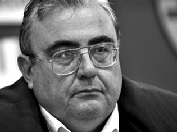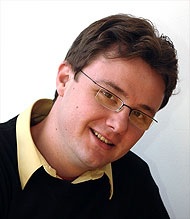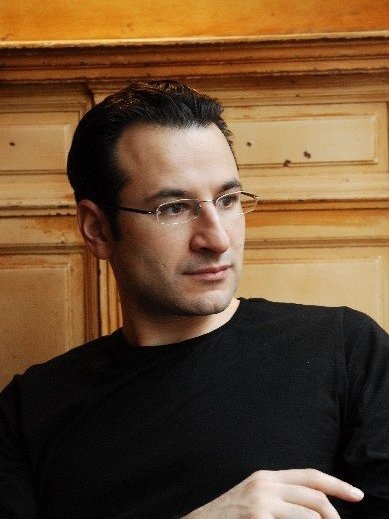A Conversation about the Shadow of Illiberal States
At present Europe finds itself in a context which bares substantial resemblance with the periods before the First and the Second World Wars. Facing mounting pressure by the extreme right political movements, an increasing number of governments are tempted to limit civil liberties, to negotiate human rights and to extend their control over the society, while looking up to authoritarian regimes outside Europe. The economic crisis and the change of how the whole world system works has put a lot of pressure on European governments and on the solidarity and values on which the European Union has been built. The session focuses on the external implications of such domestic challenges to democracy in Europe and on the desirable answer by the European Union.
Speakers:
Ognyan Minchev, Executive Director of the Institute for Regional and International Studies (BG)
 Ognyan Minchev is a non-resident fellow with GMF's Balkan Trust for Democracy and the executive director of the Institute for Regional and International Studies (IRIS), an independent think tank providing policy analyses on regional and international security and cooperation in Central and Eastern Europe. He is also Chair of the Board of Transparency International-Bulgaria, an anti-corruption organization, and a professor of political science at the University of Sofia-Bulgaria, and has been a Fulbright fellow (1991-1992) with the Department of International Relations at UCLA, and a visiting fellow (1999) at the Center for Strategic and International Studies (D.C.).
Ognyan Minchev is a non-resident fellow with GMF's Balkan Trust for Democracy and the executive director of the Institute for Regional and International Studies (IRIS), an independent think tank providing policy analyses on regional and international security and cooperation in Central and Eastern Europe. He is also Chair of the Board of Transparency International-Bulgaria, an anti-corruption organization, and a professor of political science at the University of Sofia-Bulgaria, and has been a Fulbright fellow (1991-1992) with the Department of International Relations at UCLA, and a visiting fellow (1999) at the Center for Strategic and International Studies (D.C.).
Gabor Toka, Professor at the Central European University (HU)

Gabor Toka’s research interest is primarily in voting behaviour and democratic institutions, and particularly the impact of the former on the latter. He is also interested in public opinion, survey methodology, and East European politics. He is co-author of Post-Communist Party Systems: Competition, Representation, and Inter-Party Cooperation (Cambridge University Press, 1999), and author or co-author of over five dozen articles on electoral behaviour, public opinion, political parties and democratic consolidation in edited volumes and journals. He also works as senior researcher and Member of the Board for the Median Research Centre, Bucharest.
Vlad Mixich, Journalist (RO)
 Vlad Mixich is a journalist for one of the major Romanian online news portals, Hotnews.ro. He is interested in civil society and democracy topics, the European Union and NATO security in Europe, Russia and the United States
Vlad Mixich is a journalist for one of the major Romanian online news portals, Hotnews.ro. He is interested in civil society and democracy topics, the European Union and NATO security in Europe, Russia and the United States
Moderator:
Andrei Țărnea, Executive Director of the Aspen Institute Romania (RO)
 He is a member of the Aspen Institute Romania and currently serves as the executive director of the Institute. He is a career diplomat having joined the Romanian Ministry of Foreign Affairs in 1998. His diplomatic career includes working in bilateral affairs, serving with the ministry's spokesperson, and as head of the early warning unit in the policy-planning department. He was advisor to the foreign minister between 2002 and 2004. Previously he worked for the Centre for Policy Studies and Comparative Analysis, and co-led a political and social affairs think tank. He also worked in the private sector and the Romanian Senate where he served as an advisor and researcher with the legal affairs committee. During 1996 he was the executive director for a mayoral electoral campaign in Bucharest. He was on foreign posting in Brussels between 2004 and 2010 as director of the Romanian Information Centre in Brussels, and Councilor to Romanian Embassy. In 2007 he took on the role of director of the Romanian Cultural Institute in Brussels and he served as vice president and then president of EUNIC Brussels between 2008 and 2010.
He is a member of the Aspen Institute Romania and currently serves as the executive director of the Institute. He is a career diplomat having joined the Romanian Ministry of Foreign Affairs in 1998. His diplomatic career includes working in bilateral affairs, serving with the ministry's spokesperson, and as head of the early warning unit in the policy-planning department. He was advisor to the foreign minister between 2002 and 2004. Previously he worked for the Centre for Policy Studies and Comparative Analysis, and co-led a political and social affairs think tank. He also worked in the private sector and the Romanian Senate where he served as an advisor and researcher with the legal affairs committee. During 1996 he was the executive director for a mayoral electoral campaign in Bucharest. He was on foreign posting in Brussels between 2004 and 2010 as director of the Romanian Information Centre in Brussels, and Councilor to Romanian Embassy. In 2007 he took on the role of director of the Romanian Cultural Institute in Brussels and he served as vice president and then president of EUNIC Brussels between 2008 and 2010.






